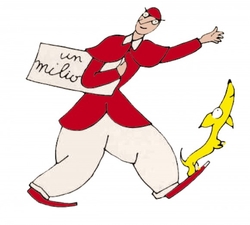Reprobation In Action
The mystery of reprobation is one of the darkest but profoundest aspects of Christianity; one in which, as it has been beautifully written, the light of God is so powerful that the human mind cannot grasp it, and therefore perceives it as obscurity. At the same time, this obscurity allows us to better grasp – at least confusedly – the vastness of God’s infinite power, and to better abandon ourselves to God’s mercy.
Still, the observing mind cannot avoid looking around and seeing how the world around him corresponds in actual fact to what he has learnt.
We are, then, infallibly taught God allows a number of people sufficient grace (hence the name) to attain salvation, but without giving them that kind of gentle but factually irresistible grace (called efficacious grace) able to infallibly lead them toward salvation.
This means that those provided merely with sufficient grace all (as in: all) end up in hell, because in God what is willed is realised also, and therefore once God has decreed that Titius will be saved, said Titius will be provided, in addition to the sufficient grace given to all, with that efficacious grace that will infallibly lead him to salvation.
This simple concept leaves one initially rather baffled: God wants all to be saved (in abstract) but allows some to merit damnation out of their free will, by actuating a behaviour and espousing a way of thinking that is entirely of their own doing, and for which therefore they themselves, and not God, are entirely responsible.
Would not an infinitely merciful God allow all to be saved? No, because the goodness of God is revealed both in His mercy and in His justice. At the appointed time, everyone will see God’s mercy and justice perfectly explained and put in practice in himself as well as everyone else: that those who have been saved have been saved because of God’s mercy, and those who have been damned have been damned because of God’s justice, in a punishment they have completely deserved and, so to speak, made entirely out of their own hands.
How can, therefore, people choose in such a way as to merit reprobation? Well, look around you! Think first of all those who very openly and very publicly defy God’s laws, and you’ll have few doubts. But please think further. All those people who think it “cool” to have “gay friends” and can’t avoid mentioning them in the usual non-judgmental context, what are they doing if not entirely espousing perversion in their heart, if admittedly not in their physical behaviour? Have they not already turned their back to God in the most grievous way? Are they not accessory in sin, and very consciously so, every day of their life? How many of them are aware – at least with a sufficient degree of discernment – that the God of the Christians is completely opposed to such perversions, and considers them abominations, but insist in thinking God’s laws rather stupid, “outdated”, plain wrong, or entirely bonkers? Have they not made a choice; a fully conscious one; one taken in the full, or at least sufficient awareness of it being in frontal conflict with the God of the Christians? Where will they hide when the time comes?
The list of such people is very long, and is becoming longer by the day as Satan’s deadly virus of “inclusiveness” metastasises and spreads into the very fabric of our once Christian societies. Nor can in this matter be opposed the argument that “invincible ignorance” is at play: firstly because Christian opposition is still spread enough that almost no one could claim lack of awareness of it – actually, even all Hindu and Muslim colleagues I ever had were perfectly aware of that – and secondly, but crucially, because in such matters we have to deal with natural law, that is: with notions of what is right and wrong that God has put in everyone of us, and that do not admit a plea of ignorance. Everyone who is not eked by perversion is, to a degree, already perverted; better said, has already allowed himself to be so.
Now, think again of what we have reasoned above: that a number of people are provided by God with sufficient (actually: more than sufficient) grace to avoid damnation; but that they, entirely out of their own will, put themselves in a position of such opposition to God’s law that, unless repentance occurs (because of God’s grace: the source of all good) they will merit hell and experience God’s justice for everyone to see. Again, the reprobates deserve their punishment entirely. Millions do it daily, entirely out of their own free will. When confronted with God’s teaching they will insist, in more or less eloquent words, that God is wrong and they are right. They will, every day of their lives, worship the golden calf of the secular societies, “inclusiveness” and “acceptance” of every perversion in a twisted – nay, perverted – concept of tolerance, and a cruel parody of charity. It’s not necessary to attend to black masses to go to hell. Being in agreement with Satan at the moment of death is more than sufficient.
Reprobates are all around us, and in this generation it appears they are taking the upper hand in many Western, and certainly in almost all Anglo-Saxon societies (this means, seen from the other side of the coin, that God allows many reprobates to operate in these disgraceful times). We have no certainty about who is going to be saved or damned and can therefore – in the individual case – not have any certainty of any one person’s damnation, or of our own very much hoped, and daily prayed for, salvation come to that. Still, the Church teaches that there are signs of reprobation and signs of predestination, and it isn’t difficult even for an atheist to grasp the fact that if God exists, then Padre Pio always was a safer bet for salvation than Gore Vidal.
Every day now I see reprobation in action, as the number of those not caring to openly deny or defy God’s laws reaches the millions only in this once great United Kingdom. Some of them will, no doubt, be saved by a merciful God who will efficaciously help them to repentance at some point before they die; but it is a very reasonable assumption (and consistently supported by the smartest theologians before V II) that a great number of those who live in defiance of God and have not shown any sign of reformation also die in the same defiance (a defiance entirely chosen and willed in its content, though certainly undesired in its consequences), and pay the price of their folly.
Satan will get a huge harvest out of this sudden love for sodomy the West has developed in its madness. At the same time, ultimately not one of those who God wills to save will be lost because of the snares of the devil, and those who damn themselves will be the sole responsible for their own destiny.
We, who hope to be saved one day, will continue to fight our battle and stick to the Faith of our fathers, in the very reasonable hope that the words of the Dies Irae will be true for us:
Confutatis maledictis
Flammis acribus addictis
Voca me cum benedictis
Mundabor
Posted on May 15, 2013, in Catholicism, Conservative Catholicism, Traditional Catholicism and tagged Predestination, Reprobation. Bookmark the permalink. 1 Comment.





















Chilling words for a world gone mad with a love of sodomy.